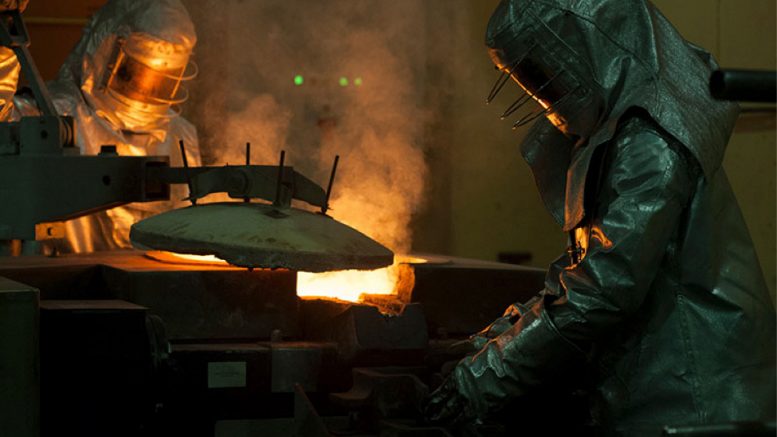Wrapping up the second day of the Association for Mineral Exploration’s (AME) Remote Roundup 2021 was a virtual session that brought together a group of industry experts who provided their perspectives on the commodities and financial markets.
Danielle Mountjoy, a mining analyst at Sun Valley Gold, moderated the session and touched upon capital raising and business risks in today’s markets and the outlook for a variety of commodities.
Among the session’s speakers was Francis Sullivan, the deputy chair for business at non-profit ResponsibleSteel, and a senior advisor, global sustainability, at HSBC Holdings.
Sullivan focussed on the implications of environmental, social and governance (ESG) investing trends on the mining sector’s ability to access capital, something he broke down into three important components.
“First, the continued access to capital is a critical issue for mining companies, and those in the metals and mining supply chains,” said Sullivan. “Second point is that investors and lenders are getting more sensitive to the [ESG] issues, especially in Europe and North America, with a sharp focus on climate risk. And thirdly, credible mine certification is becoming mainstream as a way of providing a shortcut to ESG disclosure.”
Sullivan pointed out that more and more companies are now investing not only in reducing scope one and scope two carbon emissions, but also scope three emissions, which include upstream and downstream elements.
“Leading mining companies have already realized that the growth in the green and sustainable bond markets can help finance their sustainability plans,” he said, something that also allows them to achieve responsible, low carbon production of their mine materials.
Sullivan highlighted a crucial difference from investment strategies in the 1980s, when decisions were often taken on ethical grounds. Now, those investment decisions are being taken with an eye to fiduciary responsibility, underpinned by well thought out risk management procedures.
“Over the last three years, the total assets under management following an ESG investment philosophy has over doubled, to over US$40 trillion, with a very sharp increase in the last twelve months,” Sullivan said.
He predicts that over the next few years, capital will start to shift to mining companies that have achieved certification, and away from uncertified ones. And although he does not believe every investor or lender will jump on this bandwagon, certification provides a simple proxy for sound environmental and social management.
“Banks do like simplicity and bankers themselves do like simplicity,” said Sullivan. “It makes sense to me that credit should be given to those producers who can demonstrate their responsible practices, and that capital, too, should follow to support these leaders.”
A look at broader financial trends in the commodities markets came from Mark Deriet, a quantitative and technical analyst at Cormark Securities.
He provided a concise and definitive perspective of the markets based on his analysis, and said he believes the commodity bubble has fully deflated. However, with the global economy recovering from the pandemic, he says this supports a risk-on environment. And while Deriet is bullish on gold and silver, he said investors should keep in mind commodity markets are cyclical.
“The history of commodities is that you tend to have fifteen years of a kind of boom-bust cycle, where you’re in a trading range, then you enjoy ten years of a super cycle,” Deriet said. After that comes, “five years of a reset, which we’ve gone through. And now we think we’re about five years into another fifteen-year trading range.”
The analyst said that gold remains in a long-term uptrend, though it has been quite volatile of late. But he remains bullish on the precious metal as long as it retains a “support zone” of US$1,680-1,780 per oz. If it does so, he predicts the next major upside target will be around the US$2,400 per oz. mark.
While Deriet believes gold is weathering the commodities cycles in a positive way, he pointed out there were potential impacts on the markets from inflationary issues.
“Inflation expectations are starting to rebound,” he said. “We don’t think it [inflation] will go too far, but perhaps to the 2.5%. One reason likely that inflation will remain under control is that there is still a lot of slack in the economy.”
As for silver, Deriet said that it has been stronger than gold, though it had a false breakdown back in the Spring of 2020, when it slipped below US$13.70 per oz. before quickly reversing course.
“They say that with false news comes fast moves and that’s what we saw in silver,” Deriet related, believing that the price will continue to rise.
Deriet also noted that the fiscal and monetary stimulus packages governments have provided for dealing with the pandemic seem to have worked and caused a bull run for commodities.
In terms of early signs that a bull cycle is nearing its end, Deriet said typically he keeps an eye out for extremes, with the U.S. economy being a key indicator.
“One important [sign] would be slack in the economy, both in the labour market and industries,” he said, adding that there’s still a lot of slack, not only in the U.S. but also globally. “Once that is taken up, then perhaps inflation will get out of control, central [banks] will start to hike [interest rates] and eventually rising rates and the rising cost of capital in general tends to tip the scale the other way.”


Be the first to comment on "Remote Roundup looks at commodities and financial markets"